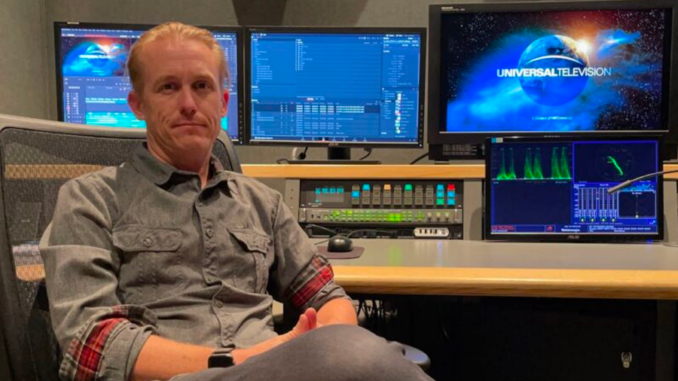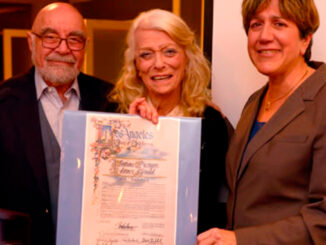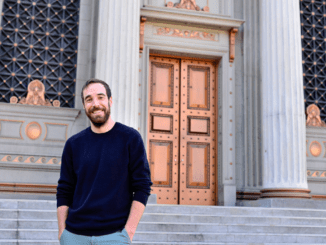
Where are you currently employed?
I’m currently employed at Studio Post on the NBC Universal lot.
Current projects?
As a television “online” or “finishing” editor, I’m between seasons of “Resident Alien,” “The Irrational,” “Lopez Vs. Lopez,” and “Primo.”
Describe your job.
I’m responsible for taking the picture side of a show from locked cut through delivery. Once the creative “offline” edit is complete, I conform or “online” the episode in DaVinci Resolve, an application that combines editing, color correction, visual effects and audio post-production. This includes relinking the timeline to the camera masters and watching the episode to catch any production issues that might have been missed during the offline cut.
I bid out an estimate of the time I think it will take to fix any production issues. The client will weigh my bid against the time and expense of sending a given shot to an outside visual effects vendor. If given the green light, I’ll complete those fixes. It can be anything from a crew reflection or some beauty work to a major continuity error. This is the part I enjoy most; each shot is unique, and figuring out the most efficient way to fix an issue is a fun challenge.
I’ll track and drop in final visual effects, often from multiple vendors. After color correction is completed and approved, it comes back to me for titles and final client screening and sign-off. Then I’ll export the final titled color-corrected master. That master file will be converted to myriad formats and delivery files, depending on what network will take delivery.
Online editing may seem a little less creatively rewarding compared to offline editorial, but I find visual effects to be a satisfying creative outlet by developing new workflows and solving problems in session and on the fly. Working for a post facility — particularly one that’s on a studio lot — has the benefit of year-round work and being exposed simultaneously to multiple projects and clients.
How did you first become interested in this line of work?
I was enrolled in an animation program in high school. The class had one of the first Avid systems set up to capture and edit our animation projects. To learn the software, we were allowed to digitize a movie and a song we liked and cut a music video together. I had a blast with that first project and decided I liked post-production more than animation.
Who gave you your first break?
I was working as an unpaid intern in the vault at Level 3 Post and was slated to be there for three months. The vault manager at the time, Gabe Perez, drove a VW GTI, and when he found out I also drove a GTI, he figured I must be a standup guy and offered me a paid position in the vault. I owe a 20-year-and-counting career to a fun car and a good boss who would go on to be a great friend.
What was your first union job?
I was a duplication machine operator at Level 3 Post, dubbing overnight dailies outputs to tape and DVDs.
What credits or projects are you proudest of, and why?
If I had to pick a show I’m most proud of, it would probably be “Halt and Catch Fire.” I handled online for only a single season, but I love the series; it immediately comes to mind when I think of a great series that I’ve been lucky enough to work on. I was also given the opportunity to do a decent amount of visual effects on the show, and I always get a kick out of doing that work.
What was your biggest challenge in your job (or on a particular project) and how did you overcome/solve it?
When starting out, I worked graveyard on the first series I had to online. I was part of a team of editors and engineers that always had each other’s backs, which is valuable at 4 a.m. with a deadline looming because you really don’t want to have to wake anyone up with a phone call. It comes down to having the confidence to figure your way around a problem, and it took a few episodes before that confidence would kick in without me first experiencing a panic attack.
What was the most fun you’ve had at work?
The time I spent working at Level 3 Post was definitely the most fun. Every post house I’ve worked in since has been a good experience and had a great team, but Level3 was like having a second family. It was a blast.
Jobwise, what do you hope to be doing five years from now?
While I want to continue to expand and improve my visual effects skill set, I enjoy being an online editor, so in five years, I hope I’ll be doing exactly what I do now.
What are your outside activities, hobbies, passions?
I enjoy spending time with my wife Suki and son Indy, noodling around on guitar, and playing video and board games.
Favorite movie(s)? Why?
“The Big Lebowski.” Every time I watch it, I catch something new.
Favorite TV program(s)? Why?
“The Wire” — Fantastic writing, characters that you don’t want to say goodbye to. “Halt and Catch Fire” — love the tone and look of the show and the time period it’s set in. Something more recent would be “Dave” on FX for a perfect balance of bizarre, hilarious, honest characters.
Do you have an industry mentor?
One constant I’ve had in my career since the beginning has been Jill Mittan. She’s a project manager/post producer who has always looked out for me and provided a wealth of guidance over the years.
I also consider as mentors everyone I’ve worked with who guided me through moving up from vault to dubber, night assist to editor’s chair. Without each one of them having the patience and taking the time to answer my incessant questions, I wouldn’t be where I am today.
What advice would you offer to someone interested in pursuing your line of work?
In the beginning, make up for a lack of knowledge in your field by being a genuine, nice person that people enjoy being around. Don’t be afraid to ask questions. I’ll always make time to help someone interested in online editing; others helped me, and I hope that whoever I help will continue the tradition. Also, this corner of post is niche enough that it’s difficult to find a good traditional class out there, so on-the-job training is a must.
Even once you’re “in the chair,” never stop learning. The second you get comfortable with your tools and techniques, something new will come along. You’ll need to be dedicated to discovering new software and train on the latest tools or you will be left behind.
Was there ever a circumstance when you had to rely on the Guild for help or assistance?
Not one in particular, but every training seminar I’ve taken, every time my family or I use our health benefits, and every time I think about inching closer to being fully vested in a pension plan, I’m grateful for being a part of MPEG and the relative security it provides.
Is there anything you’d like to say to your fellow Guild members, some words of encouragement?
Hang in there! We’ve just been through the ringer in this strike but have seen what a unified industry can accomplish when we stick together to bargain for what’s due. With next year’s negotiations coming up fast, stay informed and stay ready!





